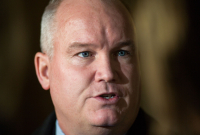Support strong Canadian climate journalism for 2025
The lines of attack have been traced for months, but now federal parties' battle plans are poised to go into effect with an election campaign set to kick off Sunday.
The Liberals hope to tout their record of steering the country through a global pandemic that threatened Canadians' health and economic stability, and can be expected to keep casting doubt on Conservatives' commitment to green efforts, LGBTQ rights and social programs.
"Notwithstanding what Erin O'Toole may say, this is a party composed, in the Liberal view, of a lot of climate change deniers," said Hamish Telford, an associate professor of political science at the University of the Fraser Valley.
A bill to ban LGBTQ conversion therapy that the Liberals introduced late in the spring sitting faced pushback from some Tory legislators, providing another opening for the Grits to exploit.
The spectre of scrapped child care could make for a third bogeyman after Ottawa signed funding agreements with eight premiers on its marquee budget item. The sign-offs come 15 years after a newly sworn-in Stephen Harper walked away from the preceding Liberal government's provincial daycare deals in favour of a $1,200 allowance to parents for each child under six.
Telford says the Tories will fire back by framing Prime Minister Justin Trudeau as an "elite, out-of-touch trust fund kid" while portraying leader Erin O’Toole as the "competent everyman … the guy next door, but very capable."
Conservatives may also seek to seize on their reputation for fiscal restraint as anxieties grow over inflation and rising debt levels following a massive $354-billion deficit for 2020-21, which pushed Canada's net debt past $1 trillion for the first time ever.
"We've had a government that's just spent a bunch of money trying to buy off Canadians, but it's left us with a debt headache unless we begin taking it on immediately," said Peter Graefe, a political science professor at McMaster University, paraphrasing the potential message.
Criticism about the speed of the Liberal response to COVID-19 could also be in the offing, despite general satisfaction with federal vaccine procurement efforts.
New Democrat Leader Jagmeet Singh, adopting a tax-the-rich populism and an upbeat tone, will test out whether his engaged delivery style and outsized social media presence will translate into votes as he accuses Trudeau of inaction on progressive goals.
"Jagmeet Singh has sort of repositioned himself as the new Jack Layton, the happy warrior," Telford said.
Taxing high earners and big business in order to fund expanded social programs almost amounts to an NDP mantra, as it did in 2019. Singh can also point to a track record where, in his telling, he pried pandemic relief out of a reluctant minority government, including beefed-up wage subsidies, emergency benefits and sick-leave payments.
Meanwhile, the Bloc Québécois' Yves-François Blanchet is targeting Conservative seats in and around Quebec City where he hopes his message of nationalism — though not outright sovereignty — will resonate.
"There's a real emphasis on the French language being under attack, and they can point to the recent choice of the Governor General (Mary Simon, who speaks English and Inuktitut but not French) as an indication the federal government has not pushed hard enough on protecting the French language," Graefe said.
After losing five seats in Quebec last time around, the Liberals see a large chunk of the path to victory running through a province known for big swings from one election to another. To defend his new turf — the Bloc went from 10 to 32 seats in 2019 — Blanchet will paint Trudeau as "not really a Quebecer; if he is, he's a Montrealer, not really a francophone," Telford said.
Further west, Green Leader Annamie Paul is fighting an uphill battle to win a downtown Toronto riding and retain the party's two remaining spots in the House of Commons. She's banking on a core environmental pitch and renewed emphasis on progressive social concerns to elevate her above the internal strife that has engulfed the Greens in recent months.
Trudeau intends to visit Simon on Sunday with a request to dissolve Parliament, triggering an election that would take place Sept. 20, according to a senior Liberal party source who spoke on condition of anonymity because they were not authorized to discuss the matter publicly.
Opposition parties have said now is not the time to go to the polls, with unfinished business in the Commons and a fourth wave of COVID-19 on the rise. But the latter might not hinder Liberal prospects.
"It could work to their advantage," Graefe said, suggesting voters may not want to change horses midstream.
"I think a lot of the dissatisfaction is with the provincial management of the pandemic at the moment."
On top of what Graefe dubs the "safe-pair-of-hands" appeal, the governing party isn't above some conveniently timed funding announcements.
Trudeau arrived in the Vancouver area last month to announce $1.3 billion in federal support for a SkyTrain extension that will connect the suburbs of Surrey and Langley. The 16-kilometre line will cut through several ridings, one that the Liberals won by fewer than four percentage points in 2019 and another they lost to the Tories by barely two.
The Grits are currently 15 seats shy of the 170 needed for a majority. "And I'm guessing they've identified about 30 ridings they're hoping they can turn," Telford said.
"So for the Liberals, the entire election is about those 30 ridings, and they will have very tailor-made policies and appeals to those ridings to turn them."
This report by The Canadian Press was first published Aug. 13, 2021.





Comments